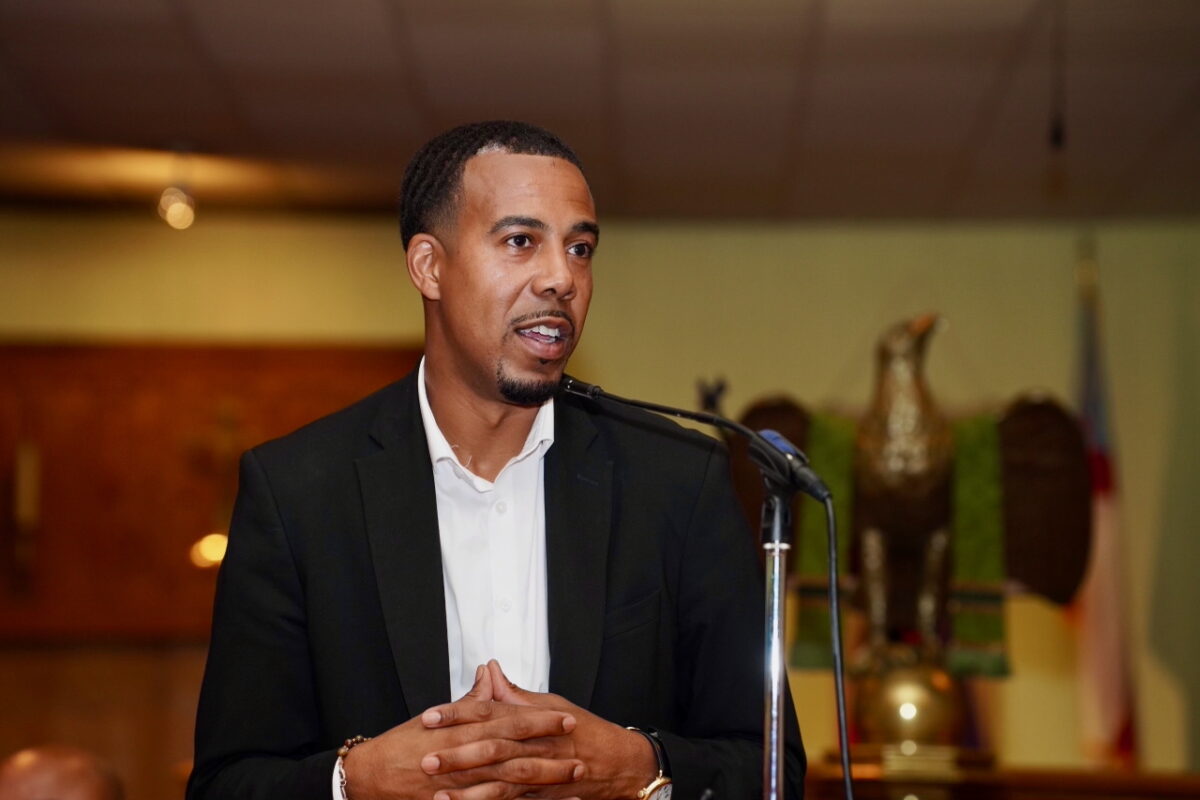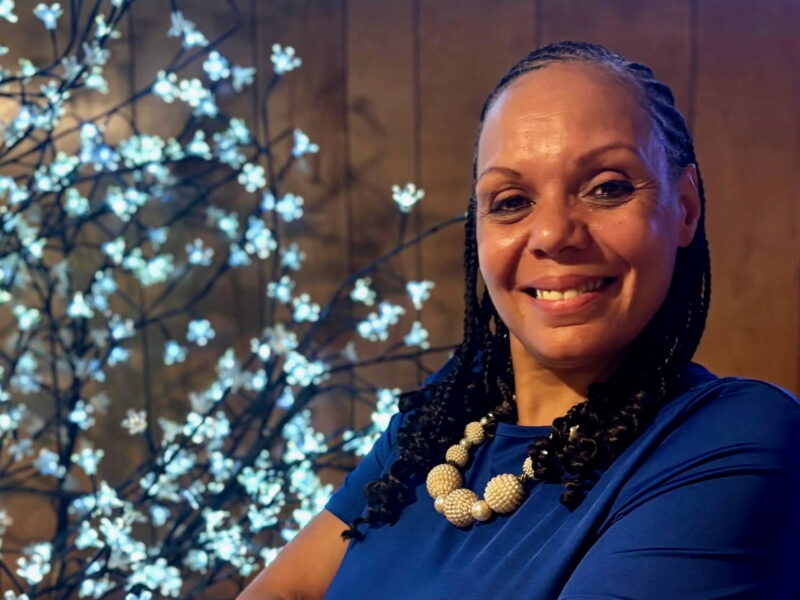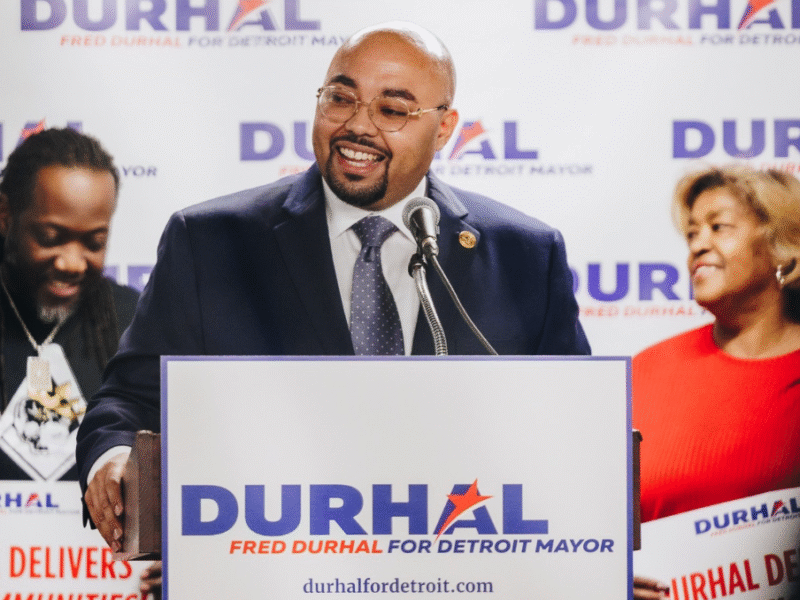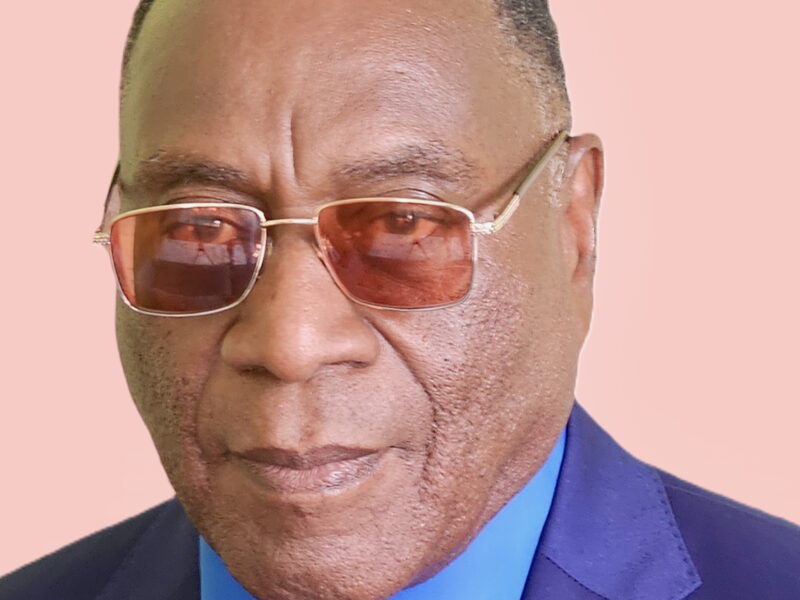Overview:
-Detroit's elected representatives are not speaking up for the city's environment, says mayoral candidate Jonathan Barlow.
-“I don't plan on letting the same players just stick around and continue to do business as usual," he says of polluting businesses in Southwest Detroit.
-Barlow advocates harnessing hydropower from the Detroit River and exploring other alternate energy sources.
Jonathan Barlow is on the ballot Tuesday in Detroit’s mayoral primary, and he spoke with Planet Detroit ahead of the election about the city’s environmental and public health challenges.
Barlow attended Renaissance High School and Wayne State University and is the founder of The WKND Company and Let’s Talk Roundtable, according to his biography.
He is a minister at Mount Pleasant Missionary Baptist Church on Detroit’s east side as well, he told Planet Detroit.
This interview has been edited for brevity and clarity.
As mayor, how would you balance economic development with environmental impact? For example, the new Stellantis plant on Mack Avenue opened under Mayor Duggan, which quickly created new air pollution issues for east side residents?
“This question specifically points directly to what makes me different, OK, the technology and the innovation that I’ve been aware of for the last 10, 20, years could have easily put us further ahead of where we are when you talk about climate democracy,” Barlow said.
“My goal is to use innovation as much as possible to put in the safeguards for when these companies come in and make sure that the incentives are tied to these climate outputs.”
In a deal such as the one struck for Stellantis’ east side plant, Barlow said: “I would have them put their whole roof full of an urban garden or something like that, in order to ensure that we’re able to start the process on reversing what they’re contributing to a negative atmosphere.”
What is your stance on Detroit’s air quality and the issue of cumulative impact?
Barlow’s grandfather pastored for 40 years in the Ecorse, Southwest Detroit, and River Rouge areas, he said.
The communities are “in a bad position, and for me to have to go to church every Sunday and drive over that, all those refineries and things of that nature, I understand it. They wanted to say that I had asthma. I won’t let them put that on me, but I know that my upbringing was a contributing factor,” he said.
The mayoral candidate said he would be “very, very diligent” as well as “very kind in my approach” with polluting businesses in Southwest Detroit such as Marathon Petroleum Corp.
His goal is to make Detroit an international innovation hub, which means attracting clean energy, Barlow said.
“I don’t plan on letting the same players just stick around and continue to do business as usual. I’m totally, totally against everything that has been going on in that area.”
Where does the mayor’s office actually come in there? Is it an issue of community benefits agreements? Is it an issue of litigation from the law department? What role does does the mayor actually play in dealing with polluters?
Community benefits agreements are not necessarily the main agreement in a development deal, Barlow said.
“The main agreement is the incentive package,” he said, adding that without a letter of intent or approval from the city, projects can’t get off the ground. By the time a project reaches the community benefits stage, it’s too late, he said.
“It’s not always legally binding in a lot of instances, and so I do believe that before they get, they have to give. And that means that before anything is preapproved, they have to, you know, show this earnest to be able to be called a good neighbor.”
Is there a role for the city to play as the federal government rolls back pollution standards?
Detroit is “the American story, good and bad,” Barlow said. “Ultimately, when you look at manufacturing, you look at innovation, we set the tone.”
The city does not use its platforms — in the form of elected officials from Southeast Michigan — properly, he said.
“We’re totally not speaking up for ourselves, and I think our leadership is to blame for it.”
What would your approach be to Detroit’s Office of Sustainability and the funding of that department?
“I have city council members, who are actually competing against me right now, tell me that we’re wasting money and the technology doesn’t work, but I hear millions of dollars being spent on technology, then I also see them approving budgets for strategists and consultants at the million dollar level,” Barlow said.
“So when you talk about funding something, I have a hard time saying we can’t fund it, or it’s not possible, or it’s not there in the budget, because I feel like we’re wasting so much money.”
The sustainability issue falls on Detroit’s corporate sector, he said: “I think it’s necessary that those who are negatively contributing be the one to positively reverse the situation.”
What is the role of the Detroit mayor in addressing the problem of DTE Energy and Detroit Water & Sewerage bills and shutoffs?
Detroit should harness energy from the current in the river and explore other alternate energy sources, Barlow said.
“I’m very interested in what’s next. And so, we start talking about energy, when we start talking about utility bills, first of all, they have to come down,” he said.
Barlow said he would build a citizen dashboard “in order to at least start to create a buffer for residents to and work out a deal with, hopefully with DTE, if they are willing to bargain. If not, we’re going to have a bigger fight.”
The mayoral candidate said he would teach financial literacy by offering incentives, giving the example of receiving a ticket to the zoo or a $20 property tax voucher for cleaning up an alley.
The mayor appoints the Detroit Board of Water Commissioners, which sets the street drainage rates, Barlow said.
“So at the end of the day, Duggan is to blame for the drainage fees, and that’s what’s causing the bills that we have, and thus I’m totally responsible, day one, of being able to adjust that through the water board commission.”
MORE FROM PLANET DETROIT
Lifelong Detroiter DaNetta Simpson’s priority in mayoral campaign? ‘Neighborhoods.’
DaNetta Simpson, who is running for Detroit mayor for the third time, is a lifelong resident with a plan for a city insurance program to address home repairs and blight.
Fred Durhal III on fixing Detroit’s flooding problem: ‘I’ll be very aggressive’
“It’s going to take a lot of funding,” Detroit mayoral candidate Fred Durhal III says of upgrading the city’s infrastructure to combat flooding.
‘Detroit needs to take its water back’: Mayoral candidate Joel Haashiim on utility shutoffs
Detroit mayoral candidate Joel Haashiim talks pollution enforcement, utility shutoffs, flooding, why he opposes neighborhood solar developments, and more with Planet Detroit.
How would you address Detroit’s growing flooding problem, and what can the mayor do to help?
“We’re not that far away from Flint. That’s what I want to say. We’re definitely not that far away from Flint. There’s a lot of pipes that need to be replaced. I think the water main break in Southwest is a testament to that,” Barlow said. “Anytime we have heavy rainfall, we can’t clear enough.”
Detroit needs real-time solutions to its infrastructure problems “so people don’t keep on suffering,” he said.
His answers for the flooding problem include an expansion of the Detroit wastewater treatment facility and a strategic, five-to-10-year plan for underground pipe replacement.
A Barlow administration would have a button on the city’s app for residents to report regular flooding, he said.
“I need to be able to map out where is this flooding taking place,” he said.
What is your stance on ICE enforcement in Detroit and the city’s friendliness to immigrants?
“ICE doesn’t belong here. It shouldn’t be here,” Barlow said, adding that the city would not be involved with the federal agency under his administration. The candidate said he would initiate a conversation with the White House and then make a public statement on the matter.
“I will have a conversation with them first to be able to ease the atmosphere,” he said.
“If I can’t have peace and love, then I’m ready to go at it any day with anybody, and if that means putting myself on the line like other mayors have done, then — my grandmother grew up with Rosa Parks.” Barlow said he would be on the front lines, rather than sidelines, of the issue.
What is your stance on Detroit’s new rental inspection ordinance and its visual-only lead inspections?
Barlow believes in the goal of creating good housing, landlords, and rental units in Detroit, he said — but added the city has never had proper relationships with its constituents. A maintenance and repair program, and landlord education, are necessary, in his view.
“And so you don’t see a landlords’ association. You see clusters of landlords. You really don’t see the table in which the landlords are coming together. And so my goal is to, again, acknowledge everyone for who they are, where they are, and that means creating a table.”





